Nutrition during pregnancy and breastfeeding is one of the most important factors during this incredible creation of life! Good nutrition is important for the health of both the mother and baby. Pregnant and breastfeeding mothers needs more kilojoules, protein, calcium, iron, B vitamins and zinc.
When it comes to hair, its no secret that post-partum hair loss is a concern for many mothers. Ensuring your nutritional needs are fulfilled throughout pregnancy and while breastfeeding can help support your hair throughout this major life stage.

Protein
During pregnancy, the need for protein increases by about 50%. Adequate, good quality protein within a balanced diet is important.
While breastfeeding, protein is absolutely essential as the production of milk depends on it. Breastfeeding women require an additional 25 grams of protein per day.
Where can I get it? Good sources include meat, fish and poultry as well as eggs and dairy foods. Vegetarian sources include nuts, seeds, grains and legumes.

Calcium
In Australia the requirements for women are 1,000mg/day and while this remains the same as for non-pregnant women, it doesn’t mean the importance of sufficient calcium does not increase. Calcium helps form baby’s bones and teeth, aids muscle function and nerve transmission.
Calcium during breastfeeding is important as it transfers from mother to baby via breastmilk. Not consuming enough via foods means the body will use calcium from the bones to meet the increased needs.
Where can I get it? Calcium is found in nuts and seeds, leafy greens, many vegetables, whole grains as well as fish and dairy products. Fortified plant milks (such as soy) offer suitable source for daily consumption.
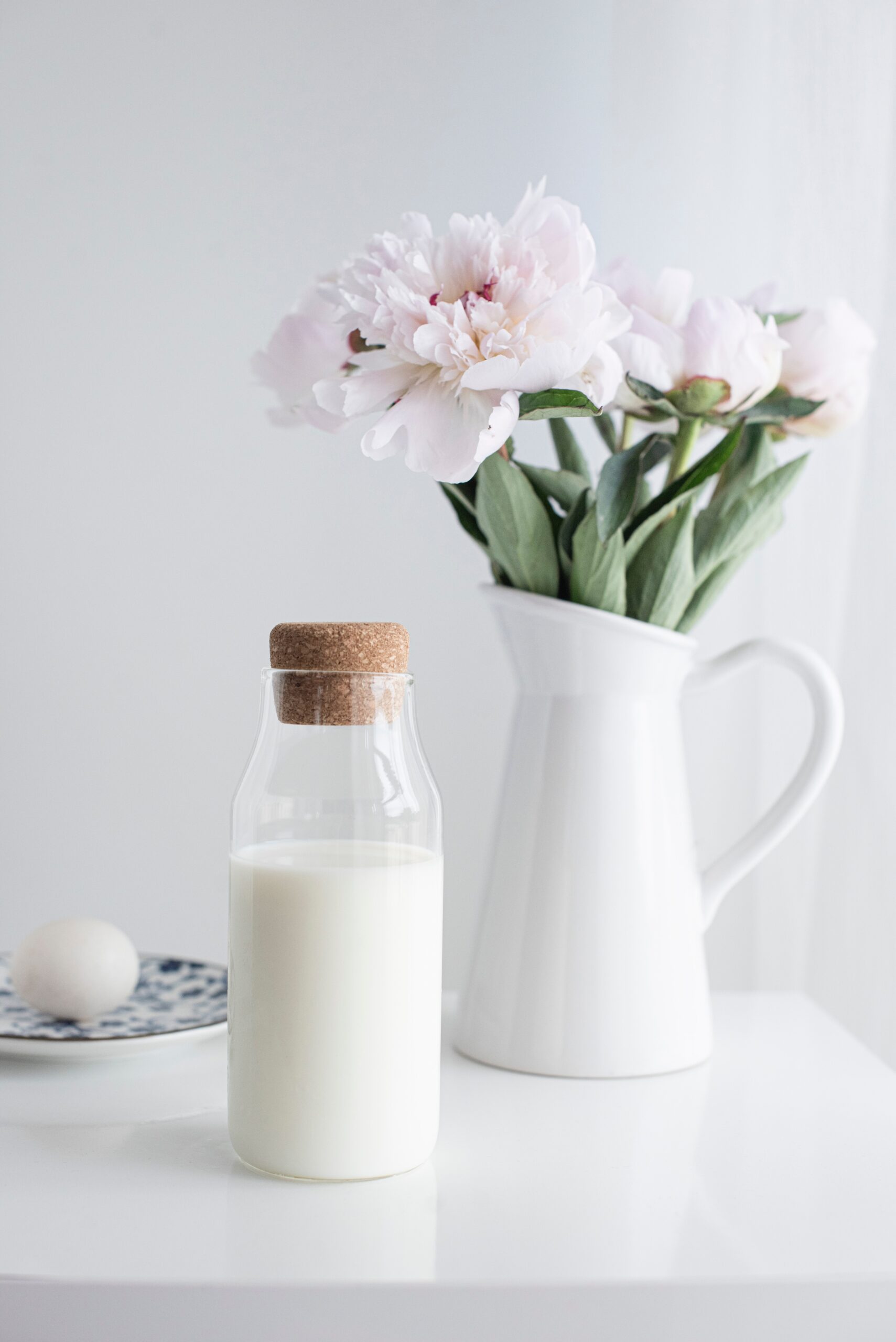
Iron
A highly important nutrient during pregnancy is iron. A woman’s blood volume has to increase by around 50% during this time. The recommended daily requirement for iron goes up to 27mg per day.
While pregnancy depletes a mother’s iron stores, breastfeeding is an important time to help rebuild these levels.
Where can I get it? Good sources of iron include red meat, eggs, chicken and salmon. Vegetable sources include mushrooms, raisins, spinach, nuts & dried fruit, seeds, seaweed and legumes.
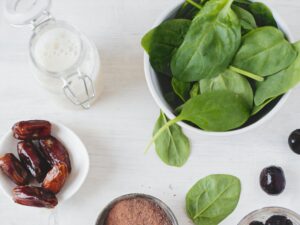
Folic Acid / Folate
This is a crucial nutrient during pregnancy and is needed to help form red blood cells, aid growth and reproduction of other cells and to support the development of the nervous system in the foetus. Deficiency of folic acid has been linked to congenital neurological defects in babies. During pregnancy needs are increased by 50% to 600 micrograms per day.
During breastfeeding the body’s requirements for folate also increase so it’s important to supply the body with good quality sources through the diet.
Where can I get it? This important vitamin is found in leafy green vegetables, whole grains, yeast, fish and dairy foods.
![]()
![]()
![]()
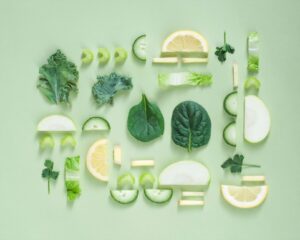
Eating during pregnancy and breastfeeding
Try to consume a well-balanced diet containing all the food nutrients, with an increased amount of kilojoules (approximately 1500 – 1800 more per day than usual). A wholesome diet is important and will help avoid wasted calories from fatty foods and sugary snacks by providing plenty of nutrient-rich foods to satisfy the increased needs for most vitamins, minerals and protein.
Hair care during pregnancy
You may find your hair is thicker and sheds less during pregnancy. This is thanks to the hormone oestrogen which speeds growth and slows down your hair’s natural shedding cycle. Increases in blood circulation, metabolism and pre-natal multi-vitamins may also deserve some credit. On the flip side however, some women may encounter hair fall and slower growth. Sometimes the hair’s texture may change during pregnancy while others may experience curly hair that was previously straight – that’s because pregnancy hormones alter the shape of the hair follicle
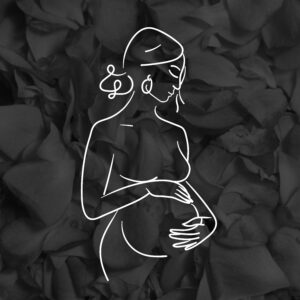
Hair care during breastfeeding
The dreaded post-partum hair loss (increased hair shedding) is common after pregnancy and while breastfeeding. You can typically point the finger at changing hormone levels in your once the baby is born. Oestrogen levels decline and can make hair seem thinner, while hair fall can feel profuse. Post partum hair loss is temporary but it may take a while before the hair returns to its pre-pregnancy condition.
Eating a balanced diet during the post-partum period with plenty of fruits, vegetables, proteins and antioxidants may help protect hair health and encourage growth.
How Hair Food can help
Hair Food has been specifically developed by a team of naturopaths and trichologists to be suitable for use during pregnancy and breastfeeding. This delicious blend is a vegan formulation containing plant proteins, Australian native antioxidants, zinc, silica as well as vitamin C from natural sources such as Kakadu plum and acerola berry powder.
The Hair Boosting Superfood Blend within Hair Food also includes beetroot juice powder, baobab fruit, bamboo shoot extract, sea buckthorn extract, Davidson plum and Guandong (Australian native peach).
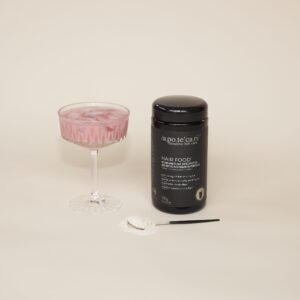
Hair Food is perfect to consume daily during pregnancy and breastfeeding to contribute to vitamin C, silica, zinc and protein levels in the diet. This luscious and versatile powder makes a quick and easy shake when mixed with cold plant-based milk, it can be added to your favourite smoothie or its perfect for adding into recipes such as protein balls or healthy pancakes. For more of our Hair Food recipe collection, click here.
Try our ultimate, naturopath-approved pregnancy and breastfeeding smoothie. This blend is easy to digest, nutrient-rich and super satisfying.
Pregnancy & Breastfeeding Smoothie*
- 1 banana frozen in chunks
- 1 cup fresh or frozen berries (if fresh, wash thoroughly)
- 1 cup of fresh baby spinach, washed and loosely packed
- 1 cup almond, soy or coconut milk
- ¼ cup soft tofu
- 1 teaspoon hemp seeds
- 1 teaspoon chia seeds
- 2 teaspoons of nut butter
- 1 tablespoon of pumpkin seeds or sunflower seeds
- 1 heaped teaspoon Hair Food (6g)
Layer all ingredients in a high powered blender and blend for 1 minute or until smooth.
*If morning sickness or food aversions are present, the ingredients can be adjusted according to taste and preference.
References
Haas EM & Levin B. Staying Healthy with Nutrition the Complete Guide to Diet and Nutritional Medicine. Celestial Arts USA, 2006. Pp 569-5575
Australian Government National Health and Medical Research Council & Ministry of Health Manatu Hauora. Nutrient Reference Values for Australia and New Zealand [accessed: www.nrv.gov.au/nutrients/]
Victorian Government Better Health Channel: Breastfeeding and your diet [accessed: https://www.betterhealth.vic.gov.au/health/healthyliving/breastfeeding-and-your-diet#about-breastfeeding-and-diet]

